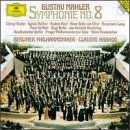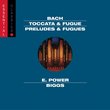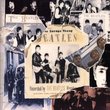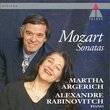| All Artists: Bryn Terfel, Gustav Mahler, Claudio Abbado, Berlin Philharmonic Orchestra, Andrea Rost, Cheryl Studer, Sylvia Mcnair, Peter Seiffert Title: Mahler: Symphonie No. 8 Members Wishing: 0 Total Copies: 0 Label: Dg Imports Release Date: 4/3/1995 Album Type: Import Genre: Classical Styles: Opera & Classical Vocal, Historical Periods, Modern, 20th, & 21st Century, Symphonies Number of Discs: 2 SwapaCD Credits: 2 UPC: 028944584325 |
Search - Bryn Terfel, Gustav Mahler, Claudio Abbado :: Mahler: Symphonie No. 8
 | Bryn Terfel, Gustav Mahler, Claudio Abbado Mahler: Symphonie No. 8 Genre: Classical
|
Larger Image |
CD DetailsSimilarly Requested CDs
|
CD ReviewsAn Eighth with few excuses Paul Bubny | Maplewood, NJ United States | 05/02/2002 (4 out of 5 stars) "As big a fan as I am of Jascha Horenstein in Mahler, and the BBC live recording of his "legendary" 1959 concert in particular, I have to say that this Abbado set--also recorded live, although probably with a little patching done here and there--needs fewer allowances made for it. As such, it's a better candidate for "the one Mahler Eighth to have if you're having only one."To put the Abbado set into perspective, I'd first like to say a little about the Horenstein. Yes, Horenstein was on top of his game the day he conducted that Albert Hall concert, and yes, it must have been a life-changing experience for those who were there. And for us listening today with benefit of hindsight, there's an emotional charge in knowing that this performance helped lead Mahler's music out of the wilderness of semi-obscurity it wandered into following the composer's death. (On Disc 1 there's even a bonus interview with "our hero.") But for those who want to take it on its own terms, without the weight of 40 years of "legendary" status behind it, as a recorded document the BBC set simply needs too many apologies. The recorded sound (stereo) does a fine job of conveying the orchestral spread but renders the chorus and soloists rather dimly. The instrumental and vocal mishaps are numerous, but the bronchially-afflicted audience coughs right on cue, every time! And the CD package for this 80-minute, Latin/German choral work includes no libretto, a serious omission especially since much of the text verges on the unintelligible, thanks to the microphone placement and the hall's acoustics.The Abbado set, by contrast, needs few excuses made for it. Okay, I'm not sure the light-toned Berlin Philharmonic has the right massiveness of sound that the work really needs in its more heavily-scored sections (although in the more chamberlike passages, the playing is exquisite). This is accentuated by DG's characteristically bass-deficient (if very clear) recording in a bass-deficient hall. Also, 81 minutes' playing time spread (thinly) over two full-priced CDs is a gyp these days, especially when Zubin Mehta's Decca "Resurrection" Symphony fits onto one disc of 81 minutes. But these quibbles are more than offset by Abbado's clear-sighted conducting, which manages to hold this unwieldy structure together while keeping its mystical and "Greatest Show on Earth" elements in balance; by the committed, nuanced and technically sure solo voices (Solti's set matches Abbado's in this regard, but Solti emphasizes brilliance and slickness over all else); by the thrilling choral work; and by the sense of a great live occasion that comes across full force." Mahler's 'only opera' very well served by maestro Abbado ... Pater Ecstaticus | Norway | 01/14/2006 (5 out of 5 stars) "I do believe, or feel, that Mahler's Eighth Symphony is being served well with restraint and thoughtfulness on the conductor's part, like here with maestro Claudio Abbado. I mean, we have here a performance of Mahler 8 that - to me at least - sounds exactly as it should: deeply concentrated and contemplative, but at the same time appropriately stately-festive. A natural-sounding ebb and flow of musical waves. Mahler's Eighth as a Natural Event unfolding as it should ... I believe that the recorded sound does add to the atmosphere of this performance, as it is a bit tenuous, with instruments sounding somewhat veiled and just a tadd distant, which results in a certain 'softness' in the orchestral sound, but all in all the resulting soundscape is natural and wide enough. At the same time, the sparse, chamber-musical-like passages are rendered wonderfully delicate and sweet, also helped, of course, by Claudio Abbado's sensitive, almost 'lyrical' conducting. Choirs blend with the orchestra in a completely natural way, as well, to my ears, not standing out at all. And maestro Abbado really knows what the difference between 'p', 'pp' and 'ppp' (and even 'pppp'?) is about, so that in Claudio Abbado's hands this music doesn't sound like just one big surging sea of forte and fortissimo waves of sound as it would in the hands of other conductors. In one word: lovely. It all really grabs my attention - like most of maestro Abbado's Mahler -, from beginning to very end, but especially because of the marvellous dramatic concentration that Claudio Abbado maintains, especially evident in Part II. Take for example the hushed intensity which the final Chorus Mysticus and orchestra maintain for two and a half minutes, only then going louder, magnificently building up to an intense peroration. How astoundingly different from Berlioz' inspiration for the very hushed ending - Gretchen arriving in Heaven - of his La Damnation de Faust: more like Mahler's 'Mater Gloriosa swebt einher' ... I simply must point out here, in this recording (because I love it so much) the sweet intensity of phrasing when Mater Gloriosa comes 'soaring in': heart-achingly beautiful how under Claudio Abbado's sensitive conducting the orchestra makes the most of all the little pauses and musical effects here, savouring all of its sweet beauty, without EVER becoming sentimental. Truly astounding! And the singing could not be bettered as well, I believe. Choruses all sound marvelously grand, but at the same time nicely clear and with crisp articulation. And what a lovely, cheeky boyish sound the Toelzer Knabenchor has! Conveying the complete ease and self-confidence of those who have never been tried by the trials of Life on Earth, but who now nevertheless reside with the angels and in the light of the Creator ;-) At least no distractingly annoying wrong diction of the words here, with these (almost) all-German-speaking choruses, which to me is kind of a distraction in many recordings. And then the Doctor Marianus of Peter Seiffert (on which, for me, hinges much of my appreciation of any whole recording of this symphony as such): I really love his voice and his finely dramatic rendition of the role here. Mr. Seiffert's beautiful, I would say almost lyrical voice conveys, I believe, just the right amount of yearning and longing, and at the same time pressing need necessary ... Just sweet (like Andrea Rost's Mater Gloriosa)! Well, for the rest, this all-star cast is of course near perfect ... I guess, with such a beautiful performance by such marvelous artists as these, it just comes down to taste: how could this performance be worth anything less than 'four stars'. You may like a different approach to this flabbergastingly astounding music (take Solti, or Rattle), but this recording still remains one of the best ever, IMHO." Why Abbado deserves the fifth star Santa Fe Listener | Santa Fe, NM USA | 09/30/2005 (5 out of 5 stars) "I haven't heard the much-praised Sinopoli set, but Abbado's combines wonderful execution and a firm sense of balance (maybe too much, if you want Part II to be less cool and atmospheric.) What gives him the highest rating for me is the vocal cast. It's enormously expensive for any orchestra to import eight top-flight soloists who each sing for only a fraction of the total length of the symphony. Really, in our time only Berlin and dG could combine forces to produce the cast we hear on this CD.
And they are very, very good. I can only ompare them to the singers on two Bernstein readings, and one each from Haitink, Colin Davis, and Michael Gielen. There is no competition, even though individual soloists, like Ben Heppner on the Davis performance, make a bigger impression than any single singer on the Abbado, just as Bernstein's unique intensity makes a deeper impression than Abbado's conducting, fine as it is. All in all, for its combination of excellence in orchestra, chorus, and soloists, I make Abbado's Eighth my first choice." |

 Track Listings (8) - Disc #1
Track Listings (8) - Disc #1








